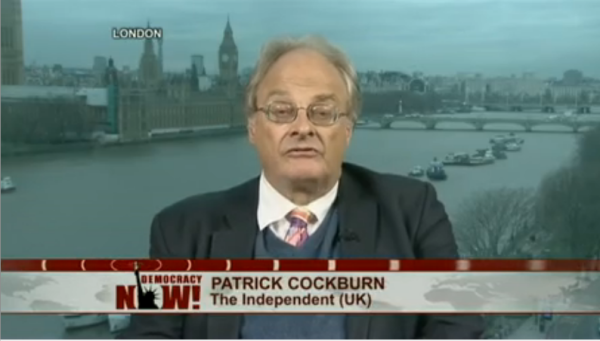AMY GOODMAN and NERMEEN SHAIKH for Democracy Now!
To discuss the role of foreign powers fueling the ongoing conflict in Syria, we are joined by Patrick Cockburn, Middle East correspondent for The Independent.
“It is clearly a proxy war. This might have started off as a popular uprising in Syria, but by now it has four or five different conflicts wrapped into one,” Cockburn explains. “You have an opposition, but an opposition that is fragmented and really proxies for foreign powers, notably Saudi Arabia, Qatar, Turkey plays a role.”
He recently wrote the article, “Mass Murder in the Middle East Is Funded by Our Friends the Saudis: Everyone Knows Where al-Qaida Gets Its Money, But While the Violence is Sectarian, the West Does Nothing.”
Reporters Without Borders has just revealed at least 10 journalists and 35 citizen-journalists have been killed in Syria in 2013. In addition, another 49 journalists were abducted in Syria — more than the rest of the world combined. Reporters Without Borders blamed the spike in killings and kidnappings on jihadi groups.
PATRICK COCKBURN: “…it is clearly a proxy war. I mean, this may have started off as a popular uprising in Syria, but by now it has four or five different conflicts wrapped into one, that—and you have an opposition, but an opposition which is fragmented and really proxies for foreign powers, notably Saudi Arabia, Qatar. Turkey plays a role. What has changed recently, since midsummer, is that Saudi Arabia is becoming the main financier for the rebel military groups inside Syria. Qatar is playing a lesser role. And the Saudis are trying to develop a Sunni Islamic force that is against the Assad government in Damascus, but is also against al-Qaeda. But this is, even so, very much a sectarian force, which is already being blamed for sectarian attacks on Christians and Druze and Alawites. There, then, of course, you also have the United States and Britain and France. A recent defector from the Free Syrian Army, who joined the al-Qaeda affiliate, Islamic State of Iraq and the Levant, said he was continually attending meetings—I don’t know—he didn’t say where, but probably in Turkey—in which always representatives of foreign intelligence services turned up, and at one moment while being presided over by the Saudi deputy defense minister.”
See/read the full interview here










